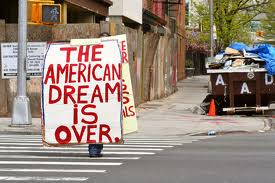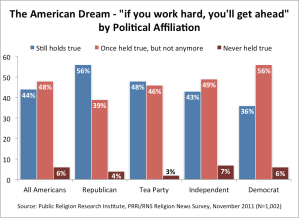Dreams change. An altered dream means the dreamer has to assess new meaning and the consequences we endure if we are to follow the new altered path of our dreams.
The American dream of owning your own home promised financial security, financial growth in the value of our homes, pride of home ownership, belonging to a community, sending our children to good schools in that community, and being part of a tribe of homeowners who invested a vast majority of their finances into an asset that promised even greater financial returns. That dream was altered in mid-2005 according to Standard and Poor’s A Year in Review January 2010’s report.
According to JD Roth’s Blog Time’s Business and Money, “The more research I do, however, the more I realize that the notion of homeownership as a magical path to wealth is a marketing ploy of the real estate industry. In fact, home prices (like gold prices) generally barely keep pace with inflation.”
If you aren’t disenchanted with the American dream after reading Roth’s quote, read it again and you will be.
What Roth is saying is the cost of living is increasing faster than the value of our homes. So with that in mind, think about retiring 20 or 30 years from now. Contemplate the “value” the resale of your home will bring to you and how that “value” will afford you a comfortable retirement in a society that costs more to live in than it did when you first bought your home. Is buying a home worth it? Has the American dream become the American nightmare?
The answer to that question lies in the term old money. When did you buy your home? Old money means more money now. If you bought your home in the 50’s or 60’s and still have it, chances are, and depending on where you live and the property taxes you pay, you haven’t lost any money on your investment. Even if you factor in maintenance, a home bought in the 50’s or 60’s will give you a good return. That’s great news for people who have owned their own homes for a long time. I am not talking ‘long’ as in 15 years, in the Real Estate world that isn’t that long. You’d have to go back 30 or 40 years for that kind of return. But what about young couples and families starting out today? Do they still want the American dream of owning their own home?
In a USA Today article about owning or renting Tara-Nicholle Nelson, consumer educator at Trulia.com says that there is a new class of renters, who although they can afford to buy a home, are instead choosing to rent. Tara-Nicholle Nelson, consumer educator at Trulia.com sates that, “One out of four renters said they never plan to own a home.”
According to Christine Dugas, author of the USA Today article, “In the past, renters tended to be college students and young married couples who were saving money for a home down payment. Now many older families who have been homeowners for years are returning to the rental market.” Despite a small increase in the value of homes, the decision of whether to buy or own your place of residence is a difficult decision for most people to make. Like everything else in life, there are pros and cons to renting or owning your own home according to Dugas.
Pros and cons of renting
- Renting can be easy. “You pay your rent, and someone else has to take care of the property,” says Ilona Bray, co-author of Essential Guide to Buying Your First Home by Nolo.
- In the past, apartments and condos were the primary rental options. But now single-family homes are more available.
- Many homeowners who can’t sell their homes have become landlords. And some investors have purchased foreclosed homes and turned them into rental property, says Jim Gaines, economist at the Real Estate Center at Texas A&M.
- If the rental vacancy rates are high, you may be able to negotiate better deals. Some landlords have been willing to offer incentives, including flat-screen TVs, tickets to sporting events, free parking or a lower deposit, says Peggy Abkemeier, president of Rent.com.
- But keep in mind that a landlord may not approve you if you have bad credit. Check your credit report before you apply to make sure there are no errors. If you have a low credit rating, you need to plan how you will explain it.
- If you have less-than-perfect credit, it also helps to show that you have a stable job, are willing to put down a deposit or will sign up for an online rental payment that comes directly out of your bank account every month, says Abkemeier.
- Renting has some disadvantages. There are often many rules. Landlords may not allow pets, or they may not let you paint the walls a different color.
Pros and cons of homeownership
- Buying a home is riskier than it was before the housing bust, when homes appreciated every year.
- “It is certainly a legitimate form of investment, but it’s not necessarily the first thing to think about when you’re buying a home,” Bray says.
- Home buyers now need to better educate themselves about the costs of ownership. For example, maintenance is unpredictable. You may suddenly discover that you need a new roof or water heater.
- And home buyers often spend more than necessary to spruce up the home. “You get into this nesting syndrome,” says Bray. “It’s part of the fun of owning a home, but it costs money.”
- Buying a home seems much more costly than renting. But as a renter, you are just giving away your money, the experts say. As a homeowner, you get a mortgage tax benefit and, in the long run, you are building equity in your home.
- “I think nowadays it’s the American nightmare,” says Stace Fuller, who lives in Fort Worth, where she bought a home with her husband in 1982. Now, she lives alone and continues to pay the mortgage. “After my husband died, I’d have been better off if I had walked away from it and rented an apartment,” she says.
Pros and cons of different cities
- In some cities, it is much cheaper to rent than buy. But in another city in the same state, it could be less expensive to buy than it is to rent.
- Trulia.com provides a quarterly Rent vs. Buy Index that is based on the 50 largest cities. For example, two cities in Texas are in the top lists: While Arlington, is the best city in which to buy a home, Fort Worth is one of the best cities for renting.
- The ratio is determined by multiplying rent times 12 months and dividing that figure into the average list price. A low ratio indicates that it’s less expensive to own than to rent.
- The rent-vs.-buy ratio is a good benchmark for making a decision, says Abkemeier at Rent.com. But there could be neighborhoods that don’t match the city’s ratio, she says.
Realtor.com also provides a list of advantages and disadvantages to owning or renting.
-
You have fewer responsibilities.
-
Someone else will handle repairs.
-
There is only a short-term commitment needed.
-
There are not a lot of other costs.
-
You can invest down payment and maintenance money into other investments.
-
It isn’t your home.
-
You might be asked to leave any time.
-
You will not share in any real estate profits.
-
There are no tax benefits.
Still not sure? Here are some more pros and cons from Smart Money.
| To Rent or to Buy | ||
| Pros | Cons | |
| Renting | Flexiblity (can relocate easily) | No equity |
| Can invest money elsewhere (stock market) | Annual rent increase could outpace inflation | |
| No upkeep fees (drippy faucets, broken dishwashers, etc.) | ||
| Buying | Tax-break: deduct mortgage interest and property taxes | Property tax and upkeep |
| Potential tax-free capital gain | Mortgage costs | |
| Emotional satisfaction | Less flexibility should you want to move; in very bad housing markets, you could lose principal | |
If you are still unsure as to whether you should buy or rent Kevin Quealy and Archie Tse of The New York Times provides an online calculator with the help of Moody’s to assist you in assessing whether or not it is a time to rent or buy. There are a few factors that you can take into consideration right off the bat according to Quealy and Tse, “Whether renting is better than buying depends on many factors, particularly how fast prices and rents rise and how long you stay in your home.” According to the online calculator, after five years of paying rent, you would have been better off buying the house instead of renting it. Up until that time, you are better off renting.
So there’s another very important factor to consider; are you staying in the one place for five plus years or will you be moving on? But just to throw a spanner into your mental metal works, here’s a thought from Jim Gallagher of the Saint Louis Post-Dispatch:
“On the one hand, houses may never be this affordable again…(on the other hand)…landlords are raising rents as vacancy rates decline. The takeaway: If you are waiting for the right moment to buy, this is it.”





